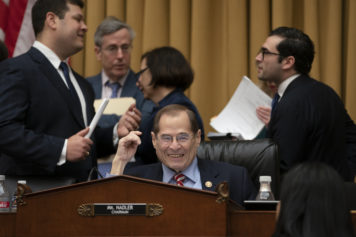
Last summer the court’s 5-4 decision struck down Section 4 of the Voting Rights Act, which determined which parts of the country must, as stipulated by Section 5 of the VRA, submit changes in their election laws for federal approval. In the eyes of many, the court decision began the dismantling of what is widely considered one of the most successful and effective pieces of legislation in U.S. history. The question before the court was whether the bitter racism of the South had changed enough for the nine states under the jurisdiction of Section 5 to be freed from oversight by the U.S. Justice Department.
Section 5 mandates that officials in a “covered” jurisdiction must prove to the satisfaction of federal officials that a “proposed voting change does not deny or abridge the right to vote on account of race, color, or membership in a language minority group.”
The Supreme Court essentially threw the issue back to Congress—although ironically Congress in 2006 voted 98-0 in the Senate and 390-33 in the House to extend the Voting Rights Act another 25 years. In response to the court, in January, Rep. Jim Sensenbrenner, R-Wis., Rep. John Conyers, D-Mich., and Sen. Patrick Leahy, D-Vt., sponsored a bill that created a new coverage formula for which states would have to submit future voting law changes to the federal government for preapproval. Under their bill, any state with five or more voting rights violations in the past 15 years would have to get federal approval to change or add any new voting laws moving forward.
But the bill has gone nowhere. With the November elections rapidly approach, voting rights activists are waiting for the House Judiciary Committee, chaired by Republican Rep. Bob Goodlatte of Virginia, to schedule a hearing or a markup on the legislation.
Leahy, meanwhile, has not been able to find Republican co-sponsors for the bill in the Senate.
“The process is what’s stalling,” Nicole Austin-Hillery, counsel and director of the Washington, D.C., office of the Brennan Center for Justice, a voter advocacy group, told Al Jazeera America. “There have been lots of conversations with members of both parties, and with the leadership within the Republican Party, but we’ve got to get a hearing.”
According to a study out of USC, there is strong evidence that “discriminatory intent underlies legislative support for voter identification laws.”
To demonstrate bias, USC researchers developed an experiment in which they sent an email correspondence prior to the 2012 election to a total of 1,871 state legislators in 14 states. The email to the legislators said, “My name is (voter NAME) and I have heard a lot in the news lately about identification being required at the polls. I do not have a driver’s license. Can I still vote in November? Thank you for your help.”
But the key to the experiment was the name used by the potential “voter”: One group of legislators received email from a voter who identified himself as “Jacob Smith,” while the other received email from “Santiago Rodriguez.” In addition, half of the legislators in each of these two groups received emails written in Spanish, while half received English-language emails.
The researchers found that legislators who were in support of voter ID laws were much more likely to respond to “Jacob Smith” than to “Santiago Rodriguez,” revealing a preference for responding to constituents with Anglophone names over constituents with Hispanic ones.
The researchers got responses from 28 percent of the legislators. Of those responses, the legislators responded to 49.4 percent of the Jacob Smith emails and 40.3 percent of the Santiago Rodriguez emails. But the biggest difference was with the legislators who supported voter ID laws: they responded to 45 percent of the Jacob Smith emails and just 27.5 percent of the Santiago Rodriguez emails. Those legislators who were against voter ID laws also showed an Anglo bias, but it was much smaller: they responded to 50.3 percent of the Jacob Smith emails and 43.4 percent of the Santiago Rodriguez emails.
Both groups were far less likely to respond to the Spanish emails: just 1.1 percent of the Spanish emails from Santiago Rodriguez got responses from the legislators in support of voting ID laws, while 11.7 percent of them got responses from those against the voter ID laws.
“Legislators who fail to respond to minority constituents and who also support laws with the effect of disfranchising minority voters may do so for partisan or electoral reasons,
but the result is political marginalization of the minority group,” wrote the study authors, Matthew Mendez and Christian Grose.


